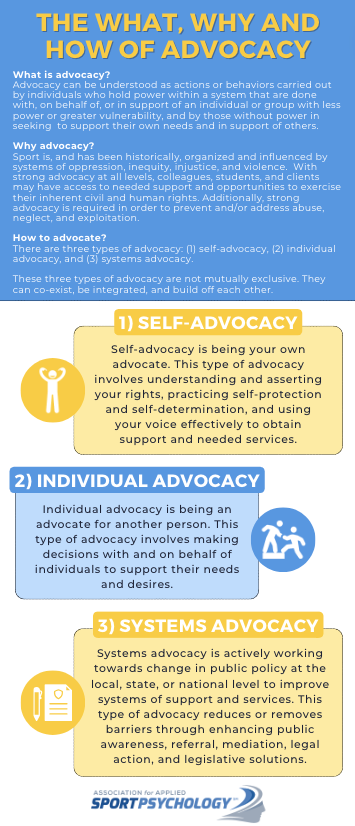Association for Applied Sport Psychology Advocacy Committee Position Statement
 The Association for Applied Sport Psychology (AASP) strives to actively promote the support and protection of the rights of all colleagues, students, and clients through advocacy within the organization and in the professional actions of its members. As an organization, AASP strives to engage in action that supports and amplifies the voices of the historically and newly marginalized and vulnerable, and those with less institutional and socio-cultural power. AASP also acknowledges that, as an organization, it sometimes falls short of this aspirational position - that its actions, policies, and practices at times have not historically embodied a spirit of social justice advocacy and, in fact, have caused harm to AASP members and other stakeholders in sport. In these instances, AASP commits to listening to, affirming, and rectifying the harm it causes. AASP strives to hold itself and its members accountable when it comes to recognizing the needs of those who are historically and newly marginalized and vulnerable and elevating them with our own power as a field, and in the role and scope of sport psychology professionals. In order to do so, AASP members must have an understanding of social justice advocacy and engage in self-reflection regarding their own beliefs and behaviors.
The Association for Applied Sport Psychology (AASP) strives to actively promote the support and protection of the rights of all colleagues, students, and clients through advocacy within the organization and in the professional actions of its members. As an organization, AASP strives to engage in action that supports and amplifies the voices of the historically and newly marginalized and vulnerable, and those with less institutional and socio-cultural power. AASP also acknowledges that, as an organization, it sometimes falls short of this aspirational position - that its actions, policies, and practices at times have not historically embodied a spirit of social justice advocacy and, in fact, have caused harm to AASP members and other stakeholders in sport. In these instances, AASP commits to listening to, affirming, and rectifying the harm it causes. AASP strives to hold itself and its members accountable when it comes to recognizing the needs of those who are historically and newly marginalized and vulnerable and elevating them with our own power as a field, and in the role and scope of sport psychology professionals. In order to do so, AASP members must have an understanding of social justice advocacy and engage in self-reflection regarding their own beliefs and behaviors.
Advocacy can be understood as actions or behaviors carried out by individuals who hold power within a system that are done with, on behalf of, or in support of an individual or group with less power or greater vulnerability, and by those without power in seeking to support their own needs and in support of others. We engage in advocacy in order to protect the psycho-emotional well-being and physical safety of fellow humans, obtain needed support or service, and promote a change in the practices, policies, and/or behaviors of third parties (Sappington & Carter, submitted to Routledge Encyclopedia of Psychology in the Real World).
The issue remains that sport is, and has been historically, organized and influenced by systems of oppression, inequity, injustice, and violence. With strong advocacy at all levels, colleagues, students, and clients may have access to needed support and opportunities to exercise their inherent civil and human rights. Additionally, strong advocacy is required in order to prevent and/or address abuse, neglect, and exploitation. Support for strong advocacy is necessary to empower individuals to be effective self-advocates as well as establish, sustain, and improve their quality of life.
There are three types of advocacy: (a) self-advocacy, (b) individual advocacy, and (c) systems advocacy. Self-advocacy is being your own advocate. This type of advocacy involves understanding and asserting your rights, practicing self-protection and self-determination, and using your voice effectively to obtain support and needed services. Individual advocacy is being an advocate for another person. This type of advocacy involves making decisions with and on behalf of individuals to support their needs and desires. Systems advocacy is actively working towards change in public policy at the local, state, or national level to improve systems of support and services. This type of advocacy reduces or removes barriers through enhancing public awareness, referral, mediation, legal action, and legislative solutions. These three types of advocacy are not mutually exclusive. They can co-exist, be integrated, and build off each other. Examples of each type of advocacy in sport/sport psychology are provided at the bottom of this document.
As individual members, we value sharing power, amplifying voices, and standing with and for those most vulnerable. In recognition of these basic tenets, AASP members strive to:
- Engage in advocacy-based actions and behaviors in practice that serve to disrupt and change systems and practices that cause violence and harm to historically and newly marginalized and vulnerable groups and that promote the welfare of historically and intentionally ignored groups/communities.
- Actively demonstrate a commitment to advocacy in research. Examples include (a) helping clients understand scientific information and research findings that may benefit them, (b) bringing a client perspective on research activities and lived experiences to advisory boards and committees, (c) providing counter-arguments to positions held by stakeholders who may not be sympathetic to your cause, and (d) conducting research with the intention of providing evidence and arguments that can be used to support a particular cause or position.
- Actively challenge policies and practices within their organizations that undermine the physical safety and psycho-emotional well-being of colleagues, students, and clients within those systems.
- Recognize and attend to cultural identities, power dynamics, and systems of privilege and oppression throughout sport and performance domains, as well as within organizations, teams, and other contexts.
- Are trained and knowledgeable about principles of multiculturalism, cultural humility, equity, inclusion, and social justice, and apply these principles to ensure the rights and dignity of all colleagues, students, and clients.
- Speak up and take action when made aware of instances of abuse, neglect, exploitation, or violence in sport.
- Support colleagues, students, and clients in becoming effective self-advocates, and toil to ensure that all are able to thrive.
- Learn and develop the skills necessary to advocate for one’s self.
- Amplify the voices of students in the field who lack institutional power within systems of academia, higher education, and applied practice
- Raise awareness of the identities, voices, and perspectives that are excluded or invalidated in decision-making processes or professional contexts, taking action to end such practices.
- Approach their work in ways that maximize representation, inclusion, and equity in sport.
- Intentionally commit to reflexivity, or the ongoing practice of critically examining one’s own beliefs, judgments, biases, and behaviors.
- Recognize and set aside one’s own desires or points of view while maintaining a level of open-mindedness and consideration of all parties to be affected by their actions.
- Withdraw from a position of power when their presence creates a conflict of interest or harmful power differential in their work.
- Fully commit to the principles outlined in the AASP Statement on Human Diversity.
Examples of Advocacy:
Self-Advocacy:
- A novice sport psychology consultant with a disability meets with their mentor to address the supports they need to capably provide consulting services.
- A sport psychology graduate student recently became a mother and finds that there are no private lactation/nursing spaces available in her academic building. She approaches her advisor and names this as a need and works with the department faculty to create this for herself and future graduate students.
- A transgender faculty member accepts their first academic job after graduation and joins a sport psychology department at a large university. They soon discover that the university-sponsored healthcare plan does not cover gender-affirming healthcare. They approach the chair of the department to name this and push for changes in healthcare coverage. The chair agrees to reach out to HR to address this.
Individual Advocacy:
- A professional sport psychology consultant, having learned that a client of theirs has been sexually assaulted by a sport administrator, takes steps to end this abuse in a trauma-informed way, helping the athlete feel empowered and heard, while also helping them pursue the necessary steps to report this abuse.
- A faculty advisor helps a student sport psychology consultant protect their own psycho-emotional well-being by connecting them with mental health supports and services, guiding them in how and when to say “no” to certain opportunities and set appropriate boundaries, and by checking in with them about what they need.
- A faculty advisor learns that their advisee, a Black woman, has faced numerous microaggressions at her practicum site and is also being exploited in terms of hours and treated differently than the White trainees. The student has tried to speak up about this with the practicum site director but has been repeatedly gaslit and dismissed. The advisor meets with the student to explore how to best support them and offers the option of meeting with the practicum site director on the student’s behalf to address these concerns.
Systems Advocacy:
- A professional sport psychology consultant initiates a Coaches Leadership session surrounding transphobic and homophobic language used in locker rooms in order to encourage change and/or the creation of a departmental policy that would result in disciplinary action for those found to use said language.
- A graduate program faculty member remains cognizant of first-generation students who may not know the intricacies of applying to higher education. This faculty member would make their colleagues aware of this during the application review process and also provide a mentorship program for first-generation students upon admission.
- A sport psychology consultant approaches the athletic director the month before the start of Ramadan to advocate for a department-wide temporary change in practice schedules for all coaches and teams in an effort to try to protect the physical safety and psycho-emotional well-being of Muslim athletes who will be fasting.




